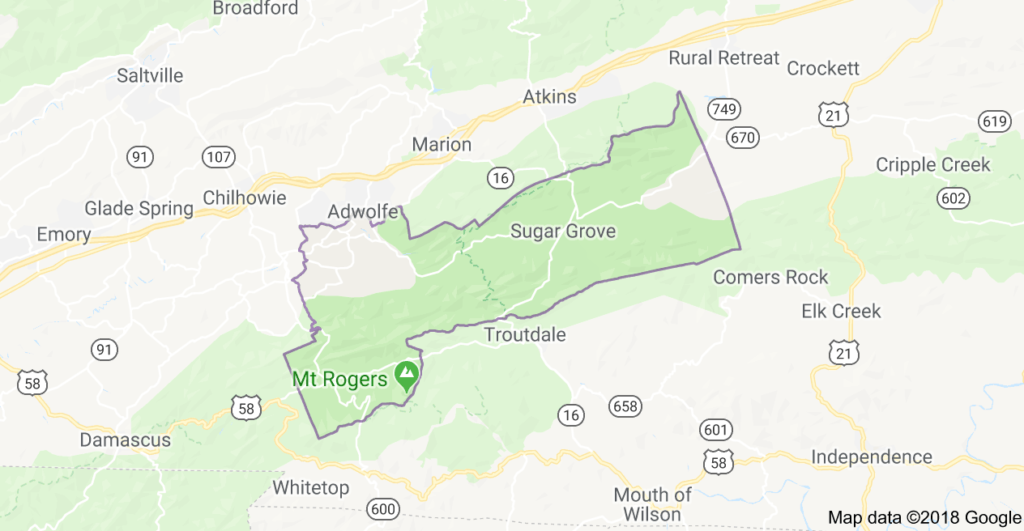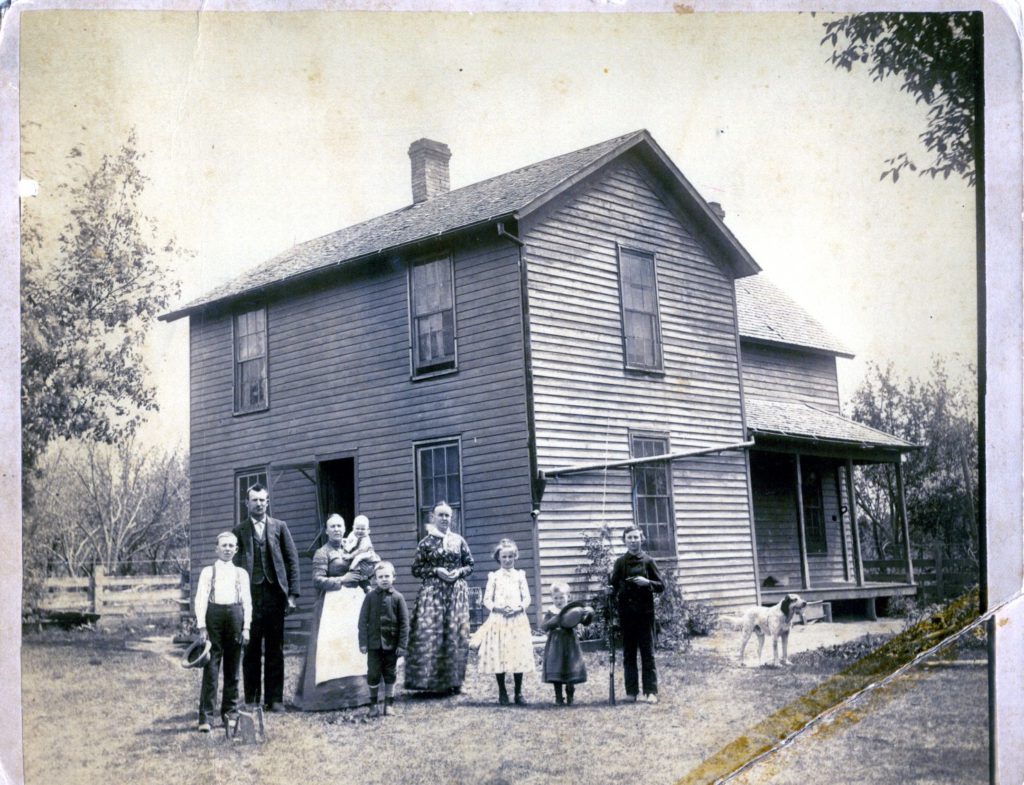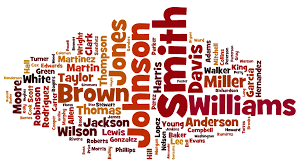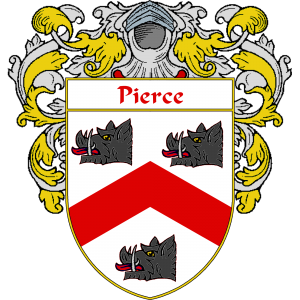|
|
| Venus John and Clifford William Pierce about 1926 |
A RACE HORSE TRAINER IS BORN
On your Own Clifford Pierce
by Marie Presnell
You are on your own dear little man
and you know right from wrong:
Quite some time back your tones began
To change from high to strong.
Be guided well while on your own,
Increase the wisdom you have shown.
An honest man receives “the breaks”
That cheaters cry about:
And in temptations Neer forsakes
His mother’s faith devout.
Be guided well while on your own,
Increase discretion you have known.
Dear little lad, in deed and word,
Remember well and long–
“Tis easy to go with the herd”
It urges you to “come along”.
Be guided well while on your own,
If you would profit when you’re grown.
“Protect your honor and your name,”
You mother’s mother said.
She wished for you no blot of shame,
And for good morals plead;
Be guided well while on your own,
That heritage do not disown.
Grandmother Louise Blum’s exact words:
“Whatever you do, preserve and protect your name and honor.”
Marie Presnell
This woman started a scrap book for Clifford to keep track of all of his achievements for his mother, Marie Blum. At the time of Clifford’s death the books were handed down to his brother Cecil
and then to me, and one can see from looking at this scrap books that Clifford had many accomplishments to be proud of from the time he was just a boy. They are caulked full of newspaper clippings and photos of horses that Cliff owned and trained for others and his winnings as a jockey, and then a trainer. His life as a profession horseman has been well documented through pictures and newspaper clippings, and he was known by horsemen all over the US.
Some might think from a public viewpoint that horse racing consist of the excitement of betting, and warm beer in wax paper cups, and are unaware of the long hours,and hard work They train these big animals, work them and care for them, and hope to achieve a measure of success in the final run for the wire. , are the hopes and dreams of a horseman. This is exactly what Cliff learned right from the start, and it wasn’t long before his face was in the papers and his popularity among the horseman begin to grow. By the time he was 20 years old he had won many races and big purses in races in California and Mexico and had mad attainments way beyond his years.
A POEM by Marie Presnall
written of Cliff
A clean sweet lad in simple faith
decided he would ride
Would taste a jockeys gay renown
From play he turned aside
He left his parents and the farm
He travel oer five states
Observing all with watchful eyes
Avoiding argument and hates
In California he resides
In patience he prevails
He rides those silky mounts each day
In joy each task he hails
His doubtful weakness is his trust
May he not place it wrong
May wisdom take him ‘neath her wing
and make his morals strong.

THE COUNTRY CALLS
Clifford was called to the second World War as was his brother John. Clifford W Pierce, Technician Third Grade Medical Detachment, 409 Infantry and served as a medical technician, and was honorably discharged from the military service in February 1946. It has been said that he witnessed the worst part of the war and that the demons followed him throughout his life. His wife would tell that the only way to wake him up was to stand at the door and throw a shoe at him, as if you would touch him he would come up swinging.
After the war, Cliff returned to the home of his parents, in Belvedere, Nebraska. His father owned a big building there and Clifford turned it into a restaurant and bar, and he also ran the feed store. This property was left to him by his father after he died. Clifford sold the store but before it was paid for, a year later, a tornado went through the town and flattened it.
Cliff took up horse training and was well known and thought of by many horse breeders. I remember as a child going to Omaha, and Uncle Cliff taking us to the barns and letting us ride around the barns on the horses, and showing us how they were cared for and prepped for the races. He took a lot of pride in his nieces and nephews, and took every opportunity to show them off.
Clifford married a beautiful young lady by the name of Barbra Dowe when she became pregnant. She lost the baby and they never had any other, and after many years, I believe it was 26, of struggling to keep their marriage together, they were divorced.
My brother, Jeff, had to good fortune of spending a summer with Clifford and Barb. Uncle Cliff bought his a shoe shine box and encouraged him to make some extra money shining shoes at the race track. I remember crying as they took off together. I wanted to go so badly but because I was a girl couldn’t go. Jeff brought back many good memories of the time he spent with his Uncle, that lasted his whole lifetime.
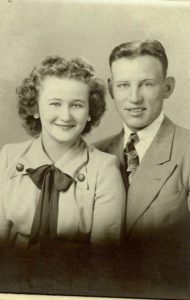
After Grandma Pierce’s funeral, my sister and I rode with Uncle Cliff from the church in Omaha to the cemetery in Fairbury, NE. He occupied us on this trip by telling us stories about my father when he was young. He had a special way of keeping your attention when he told a story. He would often pause between sentences and you would have to wait patiently for him to begin again. We were never sure if he was finished or not.
 |
| Marie and Barbara Cliff’s mother and wife |
A DAY IN THE LIFE OF A HORSEMAN
In 1968 a young man by the name of Dennis Gottchall spent the day with Cliff to gain an understanding as to just what was involved in the training and caring for the horses. Cliff was his subject and he wrote: Cliff Pierce, a Reynolds, Nebraska farmer. He is a Veteran horseman having spent three years as a jockey and 27 years as a trainer. All horsemen dream of having a “big” horse, one that is capable of running against the best and winning. These horses are few and far between. In 1962 Cliff had one outstanding horse named Jerry Get up. He was destined to be a great horse, starting eight times that year, winning six and placing second twice. In 1963 he won $64,000. We was below par after that and Cliff was to know the heartbreak of having the horse die in his stall in Chicago. The cause of the death was an incurable liver ailment. ”

HOW JERRY GET UP GOT HIS NAME
Anyone who knew Cliff, knew about Jerry Get Up. I believe he was among the most favorite of all the horses Cliff owned and trained. He was his most successful horse and was owned by AW Dow, Cliff’s father in law. In 1964 Jerrry Get up started seven races, winning five and placing second twice. The horse also ran in Ak-Sar-Ben’s Princess Stakes and Ambassadors winning $27,329 for the year.
Jerry’s mother’s name was Janey Jump UP!
When the new foal was born they contemplated over a name for him. At the time, Cliff had a jockey named Jerry that seemed to have trouble getting up in the morning. Every morning Cliff would come to the barn and go to Jerry’s room and yell “Jerry! Get UP!”
Hence the name for the new foal.
PUTTING IT ALL TOGETHER
Credit for the pictures below goes to Dennis Gottchall as well as most of the information shared here.
Cliff took care of about 20 thoroughbreds of various ages most of the time. He had two exercise boys and five stable hands to help get the job done.

There was much work that needed to be done by 10 o’clock when the track is closed in preparation for the races which would be held in the afternoon. This work required a lot of organization. Cliff instilled pride and confidence in his help with is soft outspokenness and quiet manner. Everyone began at daybreak.

The horses are fed at about 5:30 in the morning. Each horse must be galloped or walked each morning. I remember walking in the barns with the help as a child when I would get to go with Cliff. At 6 o’clock the horses were taken to the track to be galloped or to an open area to be walked.
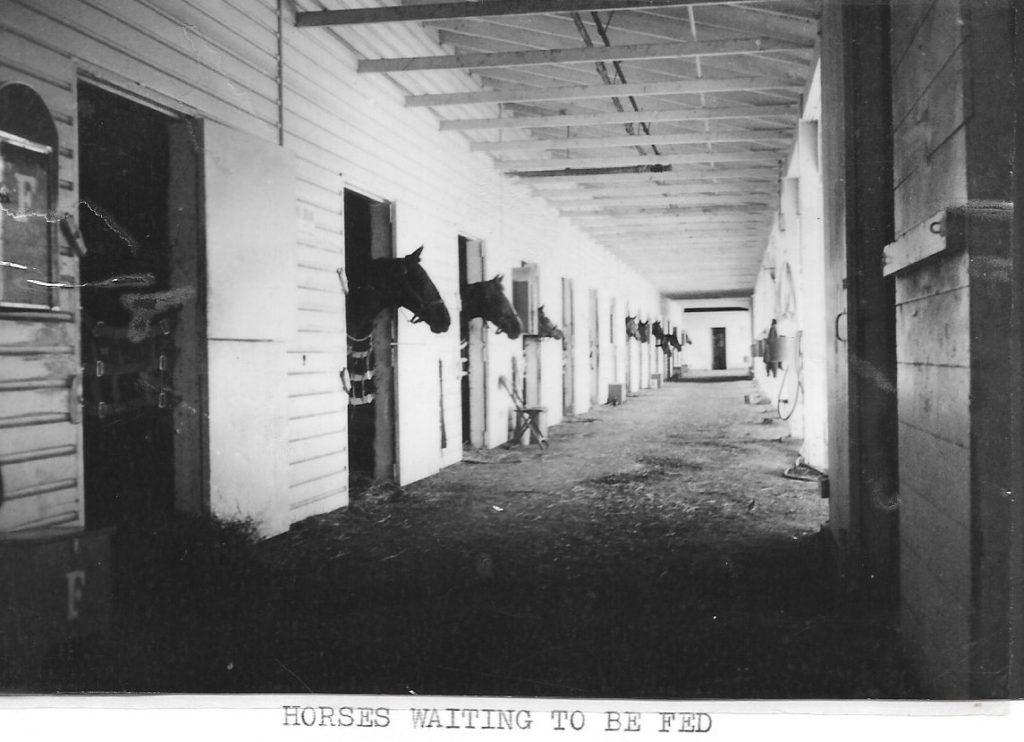
When a horse was taken to the track someone cleans his stall and puts in fresh bedding and hay. When the horse returned he would get a bath. That is a picture that still stands in my memory.was that of the horses getting washed off. They were absolutely breath taking beauties. After their baths they were cooled down by walking.

Different trainers use different procedures for exercising their horses. Some walked them two horses at once using a saddle pony.
In 1968 Cliff had a horse by the name of Foreign Comet. He had been injured before in a race and Cliff gave the horse his personal attention. He took him to the track and worked him there. From the pictures below you will see his concern as he watches for any sign of a recurring injury. The responsibility was great when you have a horse that was valued at over 75,000 dollars.


THE MORNING OF THE RACE
FOREIGN COMET was entered in the $15,000 Nebraska Bred Three year old race at a mile and 70 yards. The day was bright and sunny and no trouble was anticipated. Things happen quickly and there is no time for mistakes. The horses paced nervously in their stalls. You could tell that he sensed he was going to run.
The call comes over the loudspeaker to bring the horses to the paddock within five minutes.. The tension and anxiety begins to build as the moment of the race draws near.


When the horses reach the paddock they are taken to stalls for saddling according to the numbers assigned them on the racing program. Number one had been assigned to Foreign Comet. A paddock judge checks identification on each horse. Horses are identified by numbers tattooed inside the upper lip.
A man from the State Racing Commission supervises the saddling so that each horse carries the weight assigned to him. Lead weight in the saddle is used if the jockey”s weight varies from the assigned weight.

LJ Dureusseau was contracted to ride Foreign Comet in this race. Before leaving the paddock, the trainer gives the jockey instruction on how he would like to have the horse ridden. Once they leave the starting gate, racing strategy sometimes changes abruptly so it pays to have a good, smart jockey aboard. This was something that Cliff knew first hand.

The horses are lead onto the track about fifteen minutes before the start of the race. This gives the public a chance to view the horses in the post parade, the jockeys then have a chance to warm up the horses and get the feel of their mounts.
For this race the starting gate was in position in front of the grandstand. Foreign Comet had the number one post position which meant he would start on the inside.
One by one the horses are put into the starting gate. When they are all quiet the official starter releases them with an electric switch.
Foreign Comet tried to break out on top, but the jockey settled him into second place. He maintained that position unchallenged until they reached the home stretch. Then Dureusseau called on the big horse to go all out. Foreign Comet answered with a burst of speed and won “going away”, leaving his closest competitor four lengths behind.

The horse is then led into the winners circle where pictures are taken of the horse along with the owner, trainer, and jockey by the track photographer. This picture is a symbol of the hard work and the ultimate achievement of all those involved in the effort. A silver plate was awarded to Foreign Comet’s owner, Bart Ford. His horse had just proven himself to be the best three year old Nebraska Bred. It is the big payoff for many long hours of hard work.
The prize money is divided with a percentage going to each of the first four places. In this case, Foreign Comet’s share of the purse was $12, 457. 60 .

The tension worry and stress are all gone now as Cliff leaves the winners circle chatting with his jockey.

The end of the race does not mark the end of the day for a horseman. There is still much to be done. The track is cleared immediately so it can be conditioned for the next race. All horses are returned to their respective barns for “cooling out”.
The winner of every race at Ak-Sar-Ben must be taken to the test barn which is managed by the Nebraska State Racing commission. Each winning horse is given a saliva test and a urine test to verify that drugs have not been give to the horse.

Now the horse has to be washed, and given an alcohol bath, and cooled out in the test barn area. His appearance after his big run shows the training and effort put forth by this particular horse with his big heart that is so clearly visible. He stands proud of his accomplishment with a winner’s blood pulsing through his veins. He is given only a small drink of water as he would make himself sick if he drank too much.

He is then blanketed and taken to his stall to rest. You can see the weariness of finishing the race where he put forth all he had. 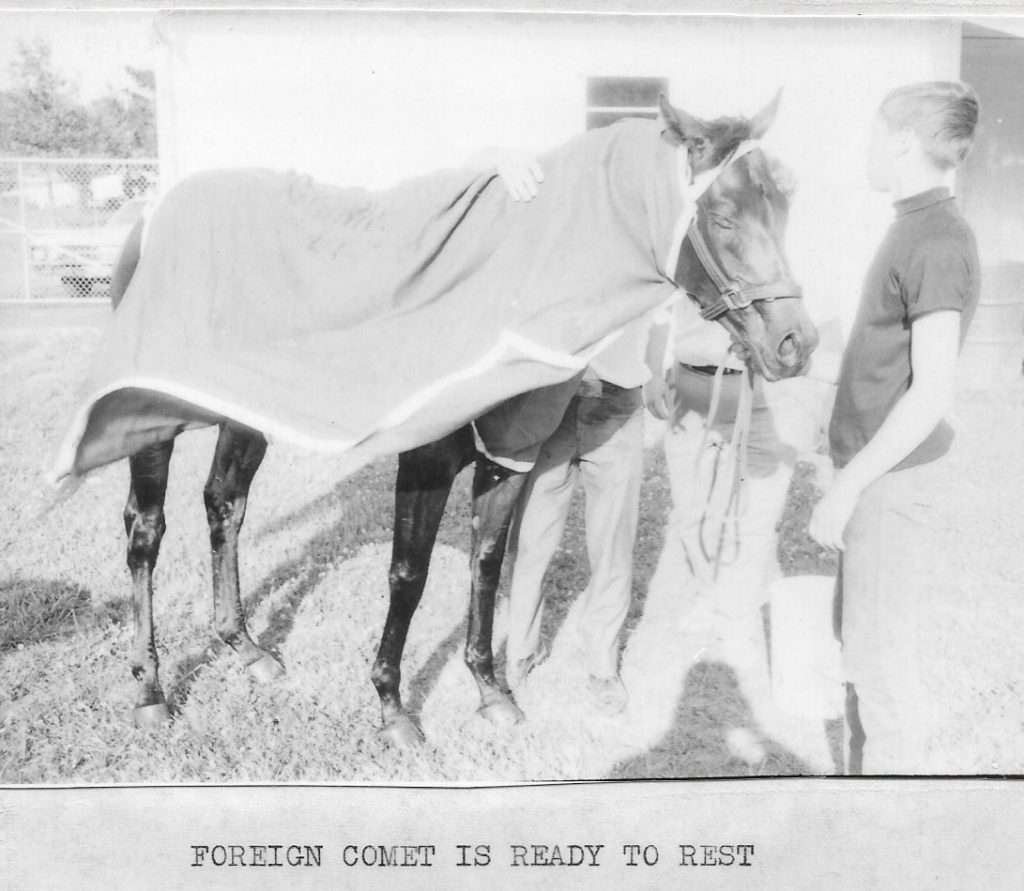
This is just one day in the life of Clifford Pierce, horse trainer. He did it day after day almost every day of his life, and traveled all over the United States participating in races. I have a file cabinet full of pictures from the winning circle to prove that he was a man who knew his trade.
HIS LOVE OF FAMILY SHOWED
I have many wonderful stories of Uncle Cliff but one of my favorites speaks of his love for his family though I don’t think he really got to spend much time with them throughout the years. After a big winning race in which my mother and father witnessed, they got together and celebrated. Cliff gave my mom $900 dollars. One hundred dollars per child and said “It’s amazing that you have all those kids and not an idiot in the bunch!”
While at war he thought of his little sister at home and sent her the then popular Shirley Temple doll for Christmas. This is just a few of the ways that he showed his generosity and love for his family. He saw to it that his mother in her old age was well cared for and did without nothing.
He was visiting our house once when my sister was about three or four and she brought him every stuffed animal and doll she had. He held onto them with care while she would go to retrieve another one until his lap was full
IT TOOK IT’S TOLL
Like most of the Pierce’s, Cliff liked his drink, and as he got older and developed aches and pains he took to self medicating himself with horse drugs. I was told that he was hooked on them, and that at one time he even had his mother taking them. All that hard living took it’s toll on Uncle Cliff and his health started to suffer. He had heart problems and had a couple of small strokes.
While training a horse at the age of 64 he died of a stroke coupled with a heart attack at Osceola, Nebraska in August of 1985. Though he made a lot of money throughout his life, he died broke, and left his nephew as executor of the estate. Denny Pierce said that it was a night mare.
Though he left a family that loved him dearly, and many friends among the community in which he lived, I think that Uncle Cliff was a lonely man.
He is buried in Fairbury, Nebraska, with his father and mother, and brother Venus John.
I hope you have enjoyed this post. I enjoyed writing it. If so, do leave me a comment in the box below and let me know. If you knew Cliff Pierce or heard of him and have a story to tell. I would LOVE to hear it!
As Always
Happy Hunting
The Pierce Family Historian








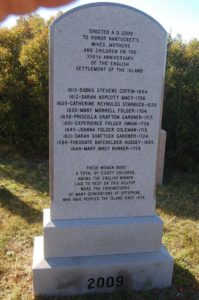 If you’ve been following along, by now you can see that our eighth, ninth and tenth great ancestors played a fundamental role in the development of our first colonies in the United States. Some came from Royalty if the lines are followed back far enough, and yet they were men and women of strength and perseverance, to flee the persecution in their homelands, and to suffer the religious wars of the time. This group of friends worked together and shared each others hardships and trials and together not only built a legacy for their descendants, built homes and businesses from little and became the leaders of the communities and states. These are the men and women from which our DNA has been pasted down for generations, and of that we have much to be proud of. The importance of family values in their daily living is proved to us time and time again as we learn more and more about their lives.
If you’ve been following along, by now you can see that our eighth, ninth and tenth great ancestors played a fundamental role in the development of our first colonies in the United States. Some came from Royalty if the lines are followed back far enough, and yet they were men and women of strength and perseverance, to flee the persecution in their homelands, and to suffer the religious wars of the time. This group of friends worked together and shared each others hardships and trials and together not only built a legacy for their descendants, built homes and businesses from little and became the leaders of the communities and states. These are the men and women from which our DNA has been pasted down for generations, and of that we have much to be proud of. The importance of family values in their daily living is proved to us time and time again as we learn more and more about their lives.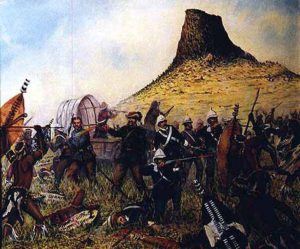 Together they buried their babies, and loved ones, and endured hardships that we have never had to know. They truly showed us the value of family, community and friendship.
Together they buried their babies, and loved ones, and endured hardships that we have never had to know. They truly showed us the value of family, community and friendship.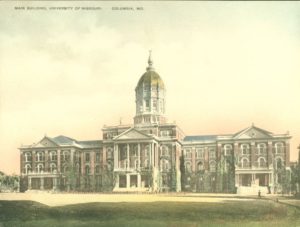 Somewhere, I read that 60% of our ancestors became farmers. Many well to do and prestigious men took to farming. Much of that of course was out of necessity. It was popular for them to gather as much land as possible. Many of them owning thousands of acres at the end of their lives.
Somewhere, I read that 60% of our ancestors became farmers. Many well to do and prestigious men took to farming. Much of that of course was out of necessity. It was popular for them to gather as much land as possible. Many of them owning thousands of acres at the end of their lives.